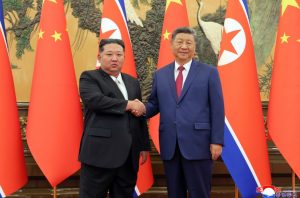The recent spectacle in Beijing, where China’s leader Xi Jinping hosted Vladimir Putin of Russia and Kim Jong Un of North Korea for a military parade, has understandably focused attention on the formation of a new anti-U.S. triumvirate. While the Russia angle adds a dangerous new dimension to regional security, to fixate on the trio is to miss the central, most resilient pillar of this new axis: the profound and deeply misunderstood relationship between China and North Korea.
For decades, U.S. strategy has been quietly predicated on the hope that Beijing’s frustration with Pyongyang would eventually create a wedge between the two nations. This view, however, is a critical misdiagnosis. The summit in Beijing was not the act of a frustrated patron, but a powerful reaffirmation of an enduring bond rooted in shared ideology and strategic necessity. As the China-U.S. rivalry intensifies, North Korea’s strategic value to Beijing is bound to increase, making China less likely to abandon a critical buffer state despite Pyongyang’s occasional provocations.
The China-North Korea relationship operates on a level deeper than traditional state-to-state diplomacy. The true foundation of their bond lies in their shared identity as socialist states led by Leninist parties. This was explicitly highlighted in the official readout from the latest Kim-Xi meeting, which emphasized the exchanging of experiences on “party and state governance” (治党治国经验交流). This is not diplomatic filler; it is the core of their alignment. For Beijing and Pyongyang, the relationship is not just about national interests, but about the existential imperative of regime survival – an ideological connection that provides a resilience that purely transactional relationships lack.
This deep-seated coordination was on full display during the period of intense summitry between 2018 and 2019. Kim’s five meetings with Xi during that time were not desperate pleas for support, but a calculated display of strategic alignment during the high-stakes diplomacy with then-U.S. President Donald Trump. Before and after his summits with Trump and South Korea’s Moon Jae-in, Kim traveled to China to brief Xi, coordinate strategy, and ensure a unified front.
Throughout these meetings, the language was consistent and revealing. Xi and Kim repeatedly spoke of their “unshakeable” and “traditional friendship,” their “shared socialist cause,” and the vital importance of “strategic communication.” This was the language of partners, not of a patron and a recalcitrant client. They were acting as a bloc, with Beijing providing the strategic reassurance that allowed Pyongyang to engage with Washington from a position of relative strength.
The 2025 Beijing summit, therefore, should not be seen as a new development, but as the logical culmination of this long-standing strategic partnership, now adapted to a new era of intensified confrontation. With the collapse of the Kim-Trump diplomatic process and the consolidation of the Japan-South Korea-U.S. trilateral security bloc, the strategic value of the China-North Korea bond has only increased.
The payoff for this enduring relationship was starkly evident in the summit’s outcomes. The meticulous, top-tier protocol afforded by Xi to Kim amounted to a full-throated political endorsement. More substantively, a subtle yet significant shift occurred: for the first time in years, Beijing’s official readouts conspicuously avoided any mention of the “denuclearization of the Korean peninsula.” The deliberate omission of this long-standing diplomatic language was an important concession to Pyongyang, a signal that Beijing now accepts North Korea’s nuclear status as a strategic reality in this new Cold War.
In return, Kim offered his own public declaration of loyalty, pledging to firmly support China on its most sensitive core interests, including Taiwan, Tibet, and Xinjiang.
For Washington and its allies, the implications are sobering. The hope that China can be pressured to “solve” the North Korea problem is a dangerous illusion. Beijing does not view Pyongyang as a problem to be solved, but as an indispensable strategic asset – a permanent security dilemma for Washington that pins down U.S. resources and attention in Northeast Asia.
The relationship between China and North Korea is not a house of cards, liable to collapse with the next provocation. It is a deeply rooted partnership, a modern-day expression of the old “lips and teeth” metaphor, fortified by a shared ideological worldview and a cold, clear-eyed assessment of their mutual interests in the face of a U.S.-led bloc. To underestimate the resilience of this bond is to fundamentally misunderstand the strategic landscape of the 21st century.





























